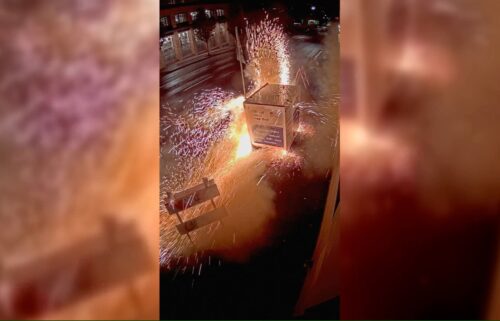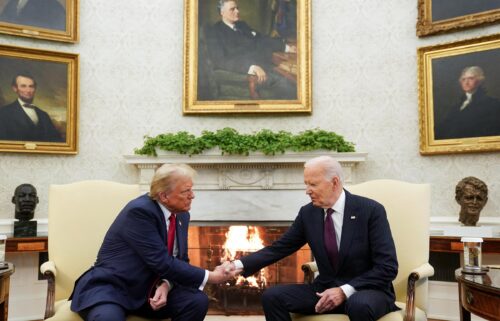How Joe Biden defended his Iraq vote
As the US War in Iraq continued to unravel in the spring of 2004, then-Sen. Joe Biden delivered a commencement speech at the University of Delaware where he addressed the original decision to go to war.
“Let me tell you what I see with Iraq,” Biden told the graduates. “We had to go into Iraq, not because Saddam (Hussein) was part of Al Qaeda, there was no evidence of that, not because he possessed nuclear weapons or because he posed an imminent threat to the United States, there was no evidence of that.”
“The legitimate reason for going into Iraq, was he violated every single commitment he made and warranted being taken down. And the international community and us had a right to respond.”
His speech more than a year after the war began reveals how Biden continued to stand by the decision to invade Iraq and his vote to authorize President George W. Bush to do so, even as some of his Democratic colleagues began to turn against the war. The comment is one several examples found during a CNN KFile review of Biden’s speeches and television appearances between 2003 and 2006 where he defended or explained his vote to authorize the use of force in Iraq.
That vote has come under increased scrutiny in recent weeks as Biden’s 2020 rivals have sought to use it as an attack on the former vice president’s foreign policy judgment. Biden has sought to recast his 2002 vote, and, at Tuesday’s debate, Biden repeated his false claim that he opposed the war in Iraq immediately after it began.
“The world, in fact, voted to send inspectors in and they still went to war,” Biden said at the debate of his 2002 vote. “From that point on, I was in the position of making the case that it was a big, big mistake.”
But KFile’s review shows how Biden continued to make the case that going into Iraq was justified in the months after the invasion and instead argued that the Bush administration bungled the execution of the war. It was not until 2005 — more than two years after the invasion — that Biden acknowledged his vote was a “mistake.”
Biden’s campaign pointed CNN back to a previous statement from Andrew Bates, a campaign spokesperson. Bates previously told CNN Biden’s current answer is in reference ” to how he immediately opposed the specific way we went to war — without giving diplomacy and the weapons inspectors a chance to succeed, based on hyped intelligence, without sufficient allies and without a plan for the day after — and the manner in which the war was being carried out.”
“He has taken responsibility for his vote for 15 years, calling it out as a mistake in 2005. And that mistake, together with the entirety of his long and distinguished record in national security and foreign policy, has informed his views ever since,” Bates said.
Continuously said he made the right vote
As the Senate debated funding the Iraqi reconstruction in October of 2003, Biden sought to use his vote in favor of the invasion as part of his argument to limit US defense spending in the country, which he argued would add billions to the deficit. Instead, Biden was proposing suspending parts of the Bush tax cuts on the upper income bracket to pay for the effort.
“For my bona fides here, I want to make it clear at the outset, No. 1, I voted to give the President the authority to go to Iraq, and I believe it was the correct vote,” Biden said. “I am not at all happy with the way the administration failed to plan for the fall of Saddam.”
Speaking on CNN’s Inside Politics the same day, Biden again defended his vote, but added the Bush administration hadn’t been level with the American people about the costs.
“My great concern here is, I supported going to Iraq. I think it was the right vote. I think it was necessary to enforce the international rules of the road,” Biden said.
Nearly two weeks later, on Meet the Press on October 12, Biden was questioned if Democratic presidential candidates could win the nomination without running against the war.
“I think they can — and the answer is, I don’t know,” Biden said. “That’s probably why it’s good I’m not running for president, because I think it was the correct vote, I just did not count on the fact that it would be handled as — with such degree of incompetence subsequent to the ‘military victory.'”
Biden continued to make the case he made the right decision, saying on NPR’s Day to Day program on March 16, 2004, he would cast the same vote again.
“I sure did,” Biden responded, when NPR mentioned he voted for the war. “It was the right vote, too.”
“So you would vote the same way today as you did a year ago,” NPR asked.
“I would,” Biden. “But no one can really hold us responsible for the incompetence of the administration in the aftermath. Many, many people said, ‘Look, Mr. President, plan for this better before you go.'”
A mistake, but the right vote
After a long primary season during which early frontrunner and former Vermont Gov. Howard Dean made opposition to the war in Iraq a key focus of his campaign, Democrats ultimately nominated someone who had voted to authorize the war, Massachusetts Sen. John Kerry, to face Bush in the presidential campaign of 2004.
Kerry never renounced his vote, but Republicans hammered him throughout the general election campaign as a flip-flopper with an on-camera comment he made about voting for a war appropriations bill before voting against it. Kerry later, in 2006, called his Iraq vote his greatest regret.
In July of 2004, Biden’s name was still circulating as a potential running mate for Kerry, though Biden himself told CNN at the time that he was “the most unlikely vice presidential pick.”
As Democrats were sorting out their ticket and their message for the general election campaign against a wartime president, something else happened in the summer of 2004: a majority of Americans began calling the Iraq war a mistake, according to polling by Gallup.
By August of 2004, Biden began to argue that he would not have voted for the war if he knew there were no weapons of mass destruction and how the Bush administration would handle the war.
Still, Biden said it was the right vote at the time.
“If you ask the question, was it right, knowing what we knew, to give the president the authority to show absolute solidarity at the United Nations to box Saddam Hussein, the answer to that is that was the correct vote at the time. It was,” he said on the Charlie Rose Show.
In November of 2005, Biden acknowledged on Meet the Press that his vote was a mistake.
“It was a mistake,” Biden said. “It was a mistake to assume the president would use the authority we gave him properly.”
However, speaking on CBS’s Face The Nation in June 2006, Biden said it was right to give George Bush the authority they gave him and responded “no” when asked if the war was a mistake.
“Some Democrats are saying that every Democrat has to say that this war was a mistake,” CBS asked Biden. “Do you think it was a mistake? If they’re going to run for president.”
“No,” Biden said, “No, I don’t think every Democrat has to say it was a mistake. It was right to give the president the authority we gave him. It was wrong to assume that he was going to know how to handle it. Look, there’s nobody out there, including the president now, that talks about having conducted this war properly.
“If I’d known the president was going to be this incompetent in his administration, I would not have given him the authority,” Biden added. “Had I been president, I would have asked for the authority.”
In his 2007 book “Promises to Keep,” which was released during Biden’s presidential bid at the time, the then-senator devoted a chapter to his 2002 vote and titled it “My Mistake.”
“I made a mistake. I underestimated the influence of Vice President (Dick) Cheney, Secretary of Defense (Donald) Rumsfeld, and the rest of the neocons,” Biden wrote. “I vastly underestimated their disingenuousness and incompetence.”




